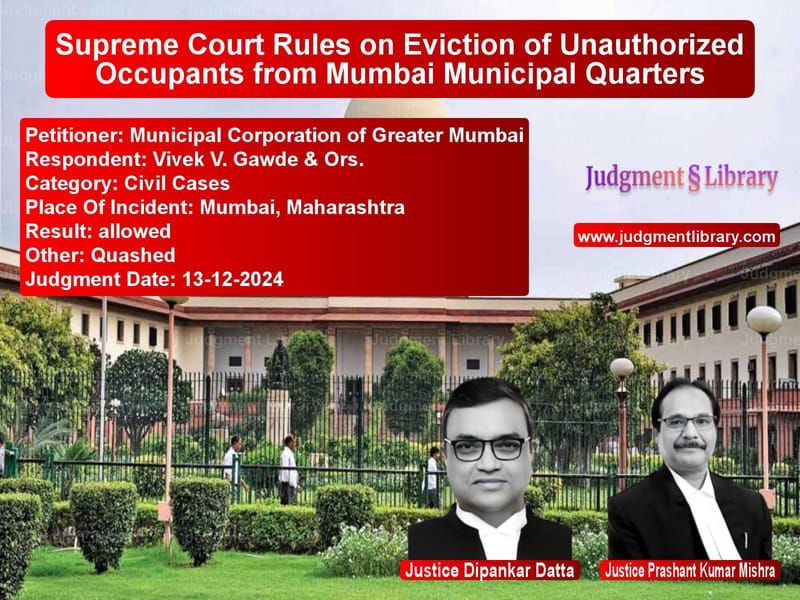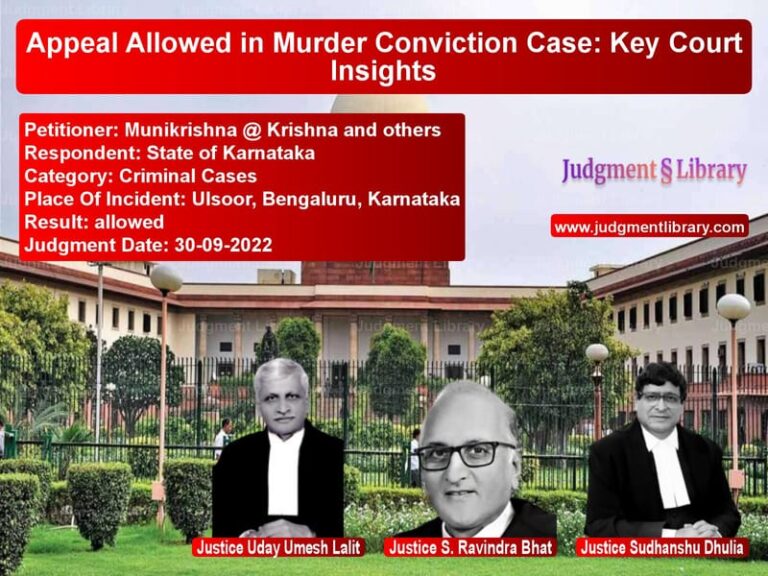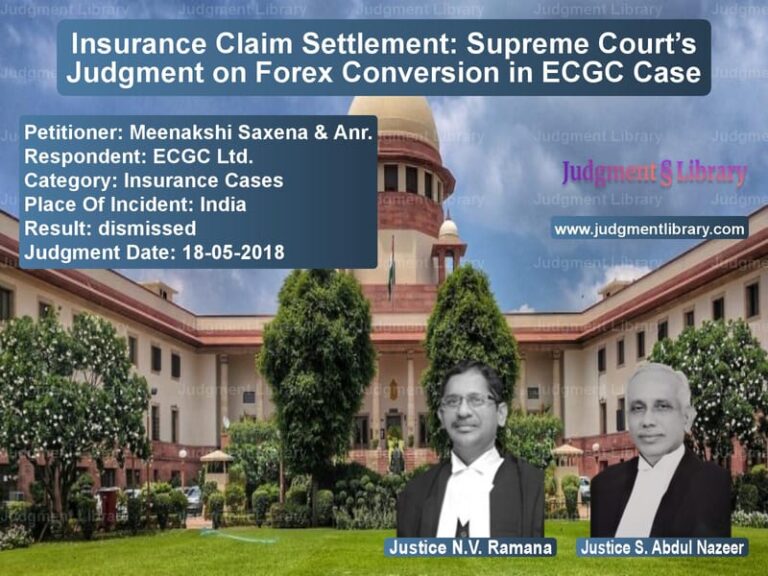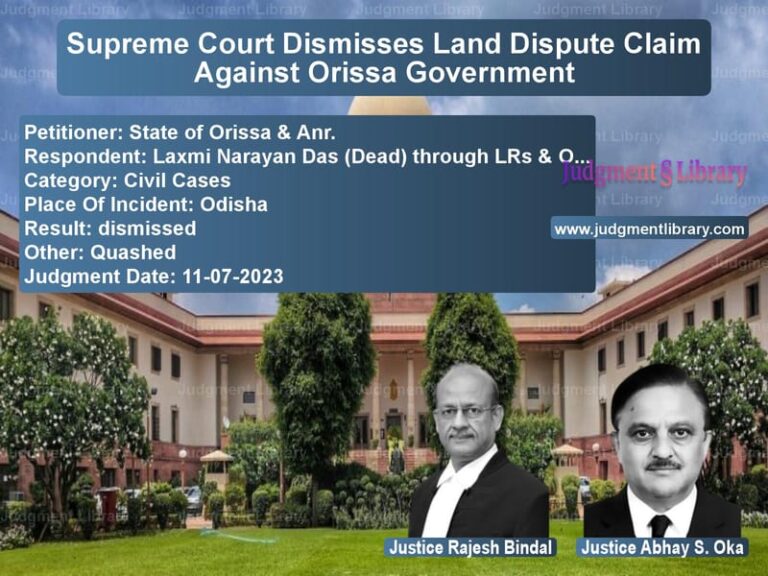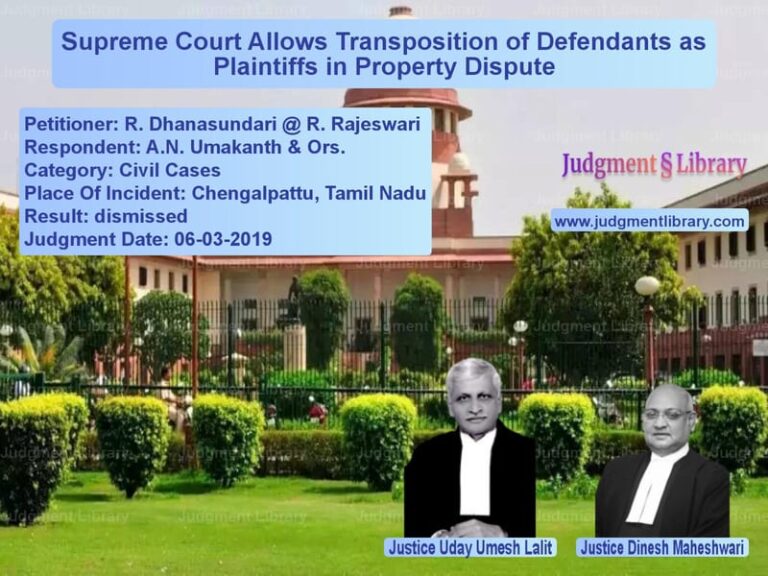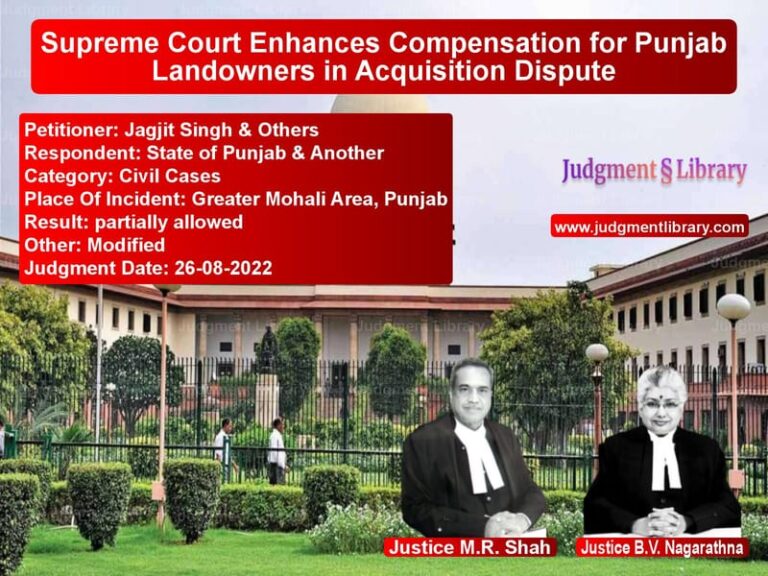Supreme Court Rules on Eviction of Unauthorized Occupants from Mumbai Municipal Quarters
The Supreme Court of India has ruled in favor of the Municipal Corporation of Greater Mumbai (MCGM) in a long-standing dispute over the eviction of unauthorized occupants from municipal staff quarters. The case, Municipal Corporation of Greater Mumbai vs. Vivek V. Gawde & Ors., involved residents who had remained in government-allocated housing despite their service tenure ending decades ago. The Supreme Court set aside a Bombay High Court order that framed specific questions for the eviction proceedings, stating that such interference was beyond judicial authority.
Background of the Case
The case pertained to eviction proceedings initiated by the MCGM against the respondents, who were either former employees or legal heirs of employees originally allotted municipal staff quarters in the 1960s. The key facts were:
- 1960s: Municipal staff quarters were allocated to employees under a leave and license agreement, explicitly stating that the license would terminate upon the occupant’s retirement.
- 2007: The MCGM initiated eviction proceedings against the occupants under the Mumbai Municipal Corporation Act, 1888.
- 2007–2017: Multiple rounds of litigation ensued, where occupants sought to claim permanent ownership based on a resolution allegedly passed by the Municipal Commissioner. The High Court and Supreme Court rejected their claims, ruling that public land could not be converted into private property.
- 2017: The Supreme Court dismissed a challenge to eviction proceedings, effectively endorsing MCGM’s authority to remove unauthorized occupants.
- 2021: The Bombay High Court ruled in favor of the occupants, stating that eviction proceedings should be conducted de novo (afresh) and must adhere to specific procedural safeguards.
High Court’s Ruling
The Bombay High Court, in its 2022 judgment, ruled that eviction proceedings must include a structured inquiry and framed nine specific questions for the Inquiry Officer to determine. These questions included:
- Whether the premises were municipal staff quarters.
- Whether occupants’ possession became unauthorized after retirement.
- Whether the eviction proceedings were initiated within the limitation period under the Indian Limitation Act, 1963.
- Whether occupants could claim rights under Section 53A of the Transfer of Property Act, 1882.
- Whether the eviction proceedings were vitiated due to “institutional bias” since the Inquiry Officer was a municipal employee.
MCGM challenged this ruling in the Supreme Court, arguing that the High Court exceeded its jurisdiction by interfering in summary eviction proceedings.
Supreme Court’s Examination
The Supreme Court, led by Justices Dipankar Datta and Prashant Kumar Mishra, reviewed whether the High Court had acted within its authority in structuring the eviction proceedings.
1. High Court Lacked Jurisdiction to Frame Issues
The Court ruled that eviction proceedings under the Mumbai Municipal Corporation Act, 1888 are summary in nature, meaning they should not be treated like a full-fledged civil trial. The role of the Inquiry Officer is to determine whether an occupant is unauthorized and proceed accordingly.
“The High Court, in framing points for determination, has exceeded the ambit of both its writ and supervisory jurisdiction.”
2. Unauthorized Occupants Cannot Claim Protection Under Property Laws
The Court rejected the argument that occupants could claim protection under Section 53A of the Transfer of Property Act, 1882, which provides rights to a transferee in possession. Since the original allocation was under a leave and license agreement, not ownership, these provisions did not apply.
“The allotments not having been made independent of their identity as municipal servants, they could not stake any claim therein.”
3. Eviction Proceedings Are Not Subject to Civil Court Limitation Rules
The respondents argued that eviction proceedings were time-barred under the Indian Limitation Act, 1963. However, the Supreme Court clarified that administrative eviction actions are not bound by the limitation period applicable to civil suits.
“Proceedings before the Inquiry Officer are administrative in character and not subject to the three-year limitation under Article 137 of the Limitation Act.”
4. No Institutional Bias Exists in the Eviction Process
The respondents claimed bias because the Inquiry Officer was a municipal official. However, the Court held that the officer was acting in a quasi-judicial capacity, and mere employment in the municipal body did not disqualify him.
“The officer, though an employee of MCGM, acts independently in a quasi-judicial role and is competent to decide the matter.”
Final Judgment
The Supreme Court ruled:
- The Bombay High Court’s judgment was set aside.
- Eviction proceedings will continue without interference.
- The Inquiry Officer will determine unauthorized occupancy based on existing legal provisions.
- The eviction process must be expedited.
Implications of the Judgment
The ruling has significant implications for urban land management and eviction law in India:
1. Reinforces Municipal Authority Over Public Land
The decision affirms that municipal bodies have the right to evict unauthorized occupants from government-allocated housing.
2. Limits Judicial Overreach in Administrative Matters
The Court clarified that High Courts should not interfere with administrative eviction proceedings unless fundamental rights are violated.
3. Prevents Abuse of Litigation to Delay Evictions
By striking down attempts to introduce procedural hurdles, the ruling ensures that eviction cases are resolved efficiently.
Conclusion
The Supreme Court’s decision in Municipal Corporation of Greater Mumbai vs. Vivek V. Gawde upholds the principles of urban governance and prevents misuse of judicial mechanisms to delay rightful eviction. By allowing MCGM to proceed with removing unauthorized occupants, the ruling ensures that public housing remains available for its intended purpose—municipal employees in active service.
Petitioner Name: Municipal Corporation of Greater Mumbai.Respondent Name: Vivek V. Gawde & Ors..Judgment By: Justice Dipankar Datta, Justice Prashant Kumar Mishra.Place Of Incident: Mumbai, Maharashtra.Judgment Date: 13-12-2024.
Don’t miss out on the full details! Download the complete judgment in PDF format below and gain valuable insights instantly!
Download Judgment: municipal-corporatio-vs-vivek-v.-gawde-&-ors-supreme-court-of-india-judgment-dated-13-12-2024.pdf
Directly Download Judgment: Directly download this Judgment
See all petitions in Property Disputes
See all petitions in Landlord-Tenant Disputes
See all petitions in Contract Disputes
See all petitions in Judgment by Dipankar Datta
See all petitions in Judgment by Prashant Kumar Mishra
See all petitions in allowed
See all petitions in Quashed
See all petitions in supreme court of India judgments December 2024
See all petitions in 2024 judgments
See all posts in Civil Cases Category
See all allowed petitions in Civil Cases Category
See all Dismissed petitions in Civil Cases Category
See all partially allowed petitions in Civil Cases Category

